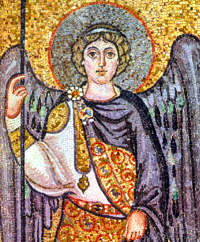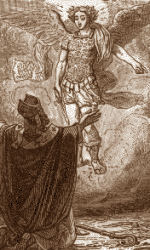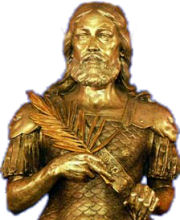
Daily Readings for:May 08, 2015
(Readings on USCCB website)
Collect: Grant us, Lord, we pray, that, being rightly conformed to the paschal mysteries, what we celebrate in joy may protect and save us with perpetual power. Through our Lord Jesus Christ, your Son, who lives and reigns with you in the unity of the Holy Spirit, one God, for ever and ever.
RECIPES
o St. Michael's Oatmeal Waffles
ACTIVITIES
o Marian Hymn: Bring Flowers of the Fairest
PRAYERS
o Regina Coeli (Queen of Heaven)
o May Devotion: Blessed Virgin Mary
o Prayer to St. Michael, the Archangel
o Litany of the Blessed Virgin Mary (Litany of Loretto)
o Litany of the Fourteen Holy Helpers
LIBRARY
o Prayer to St. Michael | Pope Leo XIII
o St. Michael: Guardian of the Church | Fr. William Saunders
· Easter: May 8th
· Friday of the Fifth Week of Easter
Old Calendar: Apparition of St. Michael the Archangel (Hist); St. Acathius, martyr (Hist)
According to the 1962 Missal of St. John XXIII the Extraordinary Form of the Roman Rite, today is the feast of the apparition of St. Michael. The feast commemorates an apparition of St. Michael on the summit of Monte Gargano, in Italy on the Adriatic coast, and the dedication of the sanctuary built on the site of the apparition. It is also the feast of St. Acathius, a priest at Sebaste, Armenia, during Diocletian's persecution.
Apparition of St. Michael
It is evident from Holy Scripture that God is pleased to make frequent use of the ministry of the heavenly spirits in the dispensations of His providence in this world. The Angels are all pure spirits; by a property of their nature they are immortal, as is every spirit. They have the power of moving or conveying themselves at will from place to place, and such is their activity that it is not easy for us to conceive of it. Among the holy Archangels, Saints Michael, Gabriel and Raphael are particularly distinguished in the Scriptures. Saint Michael, whose name means Who is like unto God?, is the prince of the faithful Angels who opposed Lucifer and his followers in their revolt against God. Since the devil is the sworn enemy of God’s holy Church, Saint Michael is given to it by God as its special protector against the demon’s assaults and stratagems.
 Various apparitions of this powerful Angel have proved the protection of Saint Michael over the Church. We may mention his apparition in Rome, where Saint Gregory the Great saw him in the air sheathing his sword, to signal the cessation of a pestilence and the appeasement of God’s wrath. Another apparition to Saint Ausbert, bishop of Avranches in France, led to the construction of Mont-Saint-Michel in the sea, a famous pilgrimage site. May 8th, however, is destined to recall another no less marvelous apparition, occurring near Monte Gargano in the Kingdom of Naples.
Various apparitions of this powerful Angel have proved the protection of Saint Michael over the Church. We may mention his apparition in Rome, where Saint Gregory the Great saw him in the air sheathing his sword, to signal the cessation of a pestilence and the appeasement of God’s wrath. Another apparition to Saint Ausbert, bishop of Avranches in France, led to the construction of Mont-Saint-Michel in the sea, a famous pilgrimage site. May 8th, however, is destined to recall another no less marvelous apparition, occurring near Monte Gargano in the Kingdom of Naples.
In the year 492 a man named Gargan was pasturing his large herds in the countryside. One day a bull fled to the mountain, where it could not be found. When its refuge in a cave was discovered, an arrow was shot into the cave, but the arrow returned to wound the one who had sent it. Faced with this mysterious occurrence, the persons concerned decided to consult the bishop of the region. He ordered three days of fasting and prayers. After three days, the Archangel Michael appeared to the bishop and declared that the cavern where the bull had taken refuge was under his protection, and that God wanted it to be consecrated under his name and in honor of all the Holy Angels.
Accompanied by his clergy and people, the pontiff went to that cavern, which he found already disposed in the form of a church. The divine mysteries were celebrated there, and there arose in this same place a magnificent temple where the divine Power has wrought great miracles. To thank God’s adorable goodness for the protection of the holy Archangel, the effect of His merciful Providence, this feast day was instituted by the Church in his honor.
It is said of this special guardian and protector of the Church that, during the final persecution of Antichrist, he will powerfully defend it: “At that time shall Michael rise up, the great prince who protects the children of thy people.”
— Excerpted from Little Pictorial Lives of the Saints, a compilation based on Butler’s Lives of the Saints and other sources by John Gilmary Shea (Benziger Brothers: New York, 1894); Vie des Saints pour tous les jours de l’année, by Abbé L. Jaud (Mame: Tours, 1950).
St. Acathius At Constantinople, St. Acathius, who, being denounced as a Christian by the tribune Firmus, and cruelly tortured at Perinthus by the judge Bibian, was finally condemned to death at Byzantium by the procunsul Flaccinus. His body was afterwards miraculously brought to the shore of Squillace in Calabria, where it is preserved with honor. — Excerpted from the Martyrology.
At Constantinople, St. Acathius, who, being denounced as a Christian by the tribune Firmus, and cruelly tortured at Perinthus by the judge Bibian, was finally condemned to death at Byzantium by the procunsul Flaccinus. His body was afterwards miraculously brought to the shore of Squillace in Calabria, where it is preserved with honor. — Excerpted from the Martyrology.
Saint Acacius was a priest at Sebaste, Armenia, during Diocletian's persecution. He was arrested and executed under the governor Maximus with seven women and Hirenarchus, who was so impressed with the devotion to their faith he became a Christian and suffered the same fate. — Excerpted from the Catholic Encyclopedia.
Patron: Against headaches and at the time of death's agony.
Symbols: Pictured with a crown of thorns.